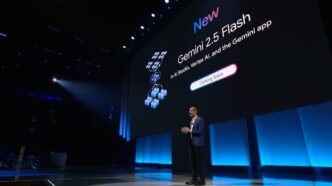Google has unveiled Gemini 2.5 Flash, the newest addition to its Gemini AI family, emphasizing fast performance and cost-effective deployment. Designed to power high-demand applications, this lightweight model will soon be available on Vertex AI, Google’s cloud-based AI development platform.
According to the company, Gemini 2.5 Flash introduces “dynamic and controllable” computation, giving developers more flexibility to fine-tune speed, accuracy, and cost depending on the task at hand. This level of customization is especially valuable for businesses managing high-volume or budget-sensitive operations.
In a blog post, Google stated, “This flexibility is key to optimizing Flash performance in high-volume, cost-sensitive applications.”
A Practical AI for Cost-Conscious Workloads
With the cost of cutting-edge AI models continuing to rise, businesses are seeking alternatives that offer solid performance without breaking the bank. Gemini 2.5 Flash fills that gap, delivering reliable outputs with slightly lower precision than flagship models but at a much more manageable price point.
The model is positioned alongside similar lightweight reasoning models such as OpenAI’s o3-mini and DeepSeek’s R1, which also trade off a bit of speed for more thoughtful, self-verifying responses. These capabilities make it ideal for tasks that require a balance between cost and cognitive performance.
Google says Gemini 2.5 Flash is particularly well-suited for use cases that demand low-latency and real-time AI responses, such as customer support bots, document parsing systems, and virtual assistants.
“This workhorse model is optimized specifically for low latency and reduced cost,” Google wrote. “It’s the ideal engine for responsive virtual assistants and real-time summarization tools where efficiency at scale is key.”
No Transparency Report for This Model
Unlike some of Google’s previous releases, no technical or safety documentation was made available for Gemini 2.5 Flash. When asked, the company noted that it doesn’t publish detailed reports for what it considers “experimental” models. This makes it more difficult for developers to assess the model’s limitations or biases in advance.
Coming Soon to On-Premises Systems
Google also revealed plans to expand the Gemini model family—including 2.5 Flash—into on-premise environments starting in Q3. These models will be hosted on the Google Distributed Cloud (GDC), catering to customers who have strict data privacy or regulatory requirements.
To power this offering, Google is partnering with Nvidia to integrate Gemini into GDC-compliant Blackwell systems, which can be purchased either directly from Google or through preferred hardware partners. This move positions Gemini to compete in enterprise AI infrastructure, where data sovereignty and control are non-negotiable.













